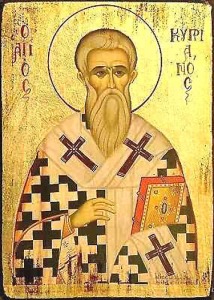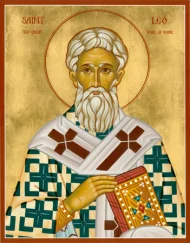 And forgive us our debts, as we also forgive our debtors (Matthew 6:12).
And forgive us our debts, as we also forgive our debtors (Matthew 6:12).
After the supply of food, pardon of sin is also asked for, that he who is fed by God may live in God, and that not only the present and temporal life may be provided for, but the eternal also, to which we may come if our sins are forgiven.
And these the Lord calls debts, as He says in His Gospel, “I forgave thee all that debt, because thou desiredst me” (Matt. 18:32).
And how necessarily, how providently and salutarily, are we admonished that we are sinners, since we are compelled to entreat for our sins, and while pardon is asked for from God, the soul recalls its own consciousness of sin!
Lest anyone should flatter himself that he is innocent, and by exalting himself should more deeply perish, he is instructed and taught that he sins daily, in that he is bidden to entreat daily for his sins.
Thus, moreover, John also in his epistle warns us, and says, “If we say that we have no sin, we deceive ourselves, and the truth is not in us; but if we confess our sins, the Lord is faithful and just to forgive us our sins” (1 John 1:8).
In his epistle he has combined both, that we should entreat for our sins, and that we should obtain pardon when we ask. Therefore he said that the Lord was faithful to forgive sins, keeping the faith of His promise; because He who taught us to pray for our debts and sins, has promised that His fatherly mercy and pardon shall follow.
He has clearly joined herewith and added the law, and has bound us by a certain condition and engagement, that we should ask that our debts be forgiven us in such a manner as we ourselves forgive our debtors, knowing that that which we seek for our sins cannot be obtained unless we ourselves have acted in a similar way in respect of our debtors.
Therefore also He says in another place, “With what measure ye mete, it shall be measured to you again” (Matt. 7:2). And the servant who, after having had all his debt forgiven him by his master, would not forgive his fellow-servant, is cast back into prison; because he would not forgive his fellow-servant, he lost the indulgence that had been shown to himself by his lord.
And these things Christ still more urgently sets forth in His precepts with yet greater power of His rebuke. “When ye stand praying,” says He, “forgive if ye have aught against any, that your Father which is in heaven may forgive you your trespasses. But if ye do not forgive, neither will your Father which is in heaven forgive you your trespasses” (Mark 11:25).
Cyprian of Carthage (d.258): On The Lord’s Prayer, 22-23.









[…] Continued from here…. […]